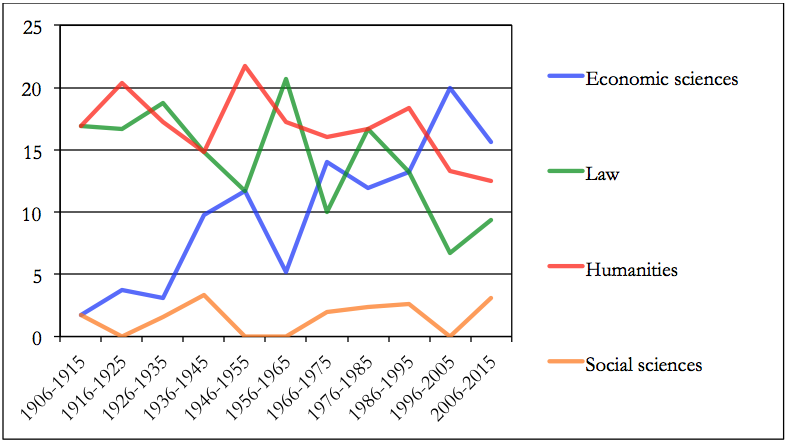
By Thierry Rossier, University of Lausanne
A recent publication by Marion Fourcade, Etienne Ollion and Yann Algan [1] focused on the implicit order among the social sciences, which seem to be dominated by economics. Economists in the US academic space occupy better financial (and institutional) positions compared to the other disciplines. At the same time, the discipline’s emphasis on mastering quantitative reasoning (mathematics and statistics) seems to be fully acknowledged as an indicator of higher intellectual capabilities from the point of view of other social scientists. Therefore, this “objective” superiority of economics is accompanied by a strong subjective feeling of superiority among peers. Furthermore, it translates into a strong hierarchy among economists, which prevents dissident or dominated voices from expressing themselves. From the outside the group appears as highly cohesive.
In our study on the academic elites in Switzerland we have historically analysed the legitimacy and institutional power of economists compared to scholars from other disciplines. An interesting indicator is the share of members of a discipline who become rector (or president) of a university. Currently three out of 12 current rectors of Swiss universities have been teaching in economic faculties: Thomas Bieger (University of St.Gallen), Andrea Schenker-Wicky (University of Basel) and Yves Flückiger (University of Geneva).
Figure 1: Proportions of rectors from economic sciences, law, humanities and social sciences, 1906-2015 (in %)

Notes: source: the “Swiss elites database”. The total number of rectors between 1906 and 2015 is N=455. Economic sciences comprise economics and business studies. Law comprises public, private and penal law. Humanities comprise linguistics, literature studies, history, philosophy and other arts disciplines. Social sciences comprise sociology, anthropology, ethnology, media and communication studies, political science, psychology and pedagogy.
Historically, we can observe a clear rise of the number of economists who become rectors at Swiss universities. Professors of economic sciences held very few institutional positions of power within the universities at the beginning of the 20th century. At this historical period most of the rectors came from law and the humanities. However, over the course of the past 100 years, economists and business professors were increasingly elected as rectors. About 20% of all rectors of Swiss universities between 1996 and 2005 were from the economic sciences. As opposed to this, less and less rectors come from law and the humanities. If the election as a rector is a sign for the prestige and the influence a discipline enjoys in the academic field, these two disciplines have lost in importance over the 20th century. Only very few professors ever came from the social sciences – even though the disciplines of the social sciences have known an important rise in numbers of professors and students in the second half of the 20th century, they are not very well represented in the powerful positions of the university system.
[1] FOURCADE, Marion, OLLION, Etienne & ALGAN, Yann, “The Superiority of Economists”, in Journal of Economic Perspectives, 29(1), 2015: 89-114.